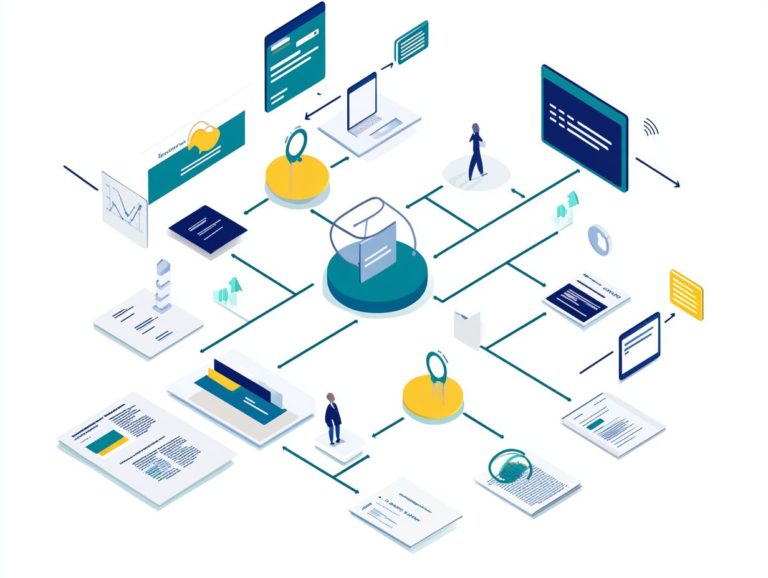Is CRM Software Worth the Investment?
In today’s fast-paced business landscape, grasping the nuances of customer relationships is more vital than ever for you.
CRM software serves as a powerful ally, crafted to elevate your interactions with clients, streamline your sales processes, and manage data with remarkable efficiency.
This article delves into what CRM software entails, showcases its myriad benefits, and highlights the key factors you should consider before making that investment.
You’ll learn how to maximize your return on investment through effective implementation strategies and methods for measuring success.
Discover how CRM can transform your business relationships today!
Contents
- Key Takeaways:
- Understanding CRM Software
- Benefits of CRM Software
- Factors to Consider Before Investing in CRM Software
- Maximizing the ROI of CRM Software
- Frequently Asked Questions
- Is CRM Software Worth the Investment?
- What are the key benefits of using CRM software?
- How does CRM software improve customer relationships?
- Can CRM software help increase sales and revenue?
- Is CRM software only beneficial for large businesses?
- What factors should be considered when choosing Customer Relationship Management (CRM) software?
Key Takeaways:

- CRM software improves customer relationships, enhances data management, and streamlines sales processes.
- Before investing in CRM software, consider cost, integration with existing systems, and training and support.
- Maximizing ROI requires effective implementation strategies and ongoing success measurement.
Understanding CRM Software
Grasping the nuances of CRM software is vital for businesses looking to elevate their sales performance.
A robust Customer Relationship Management (CRM) system is a critical sales tool. It enables you to effectively manage leads and enhance customer interactions.
This software empowers your sales representatives and marketing teams by centralizing customer data. It encourages collaboration across departments, ultimately propelling your business growth.
What is CRM Software?
CRM software serves as your digital helper in managing customer relationships with finesse.
It organizes lead qualification and makes managing customers easier, ensuring you’re always one step ahead.
This technology empowers you to track interactions, analyze data, and automate repetitive tasks, significantly enhancing your sales pipeline management.
By offering valuable insights into customer behavior, CRM systems like HubSpot and Salesforce allow you to prioritize leads and forecast revenues accurately. This means you can tailor your marketing efforts to proactively meet customer needs.
With effective CRM solutions, you elevate customer satisfaction by ensuring timely follow-ups and personalized communications.
This not only fosters loyalty but also drives repeat business, positioning you for long-term success.
Benefits of CRM Software
The advantages of CRM software reach far beyond mere data management.
They include enhanced customer retention, streamlined sales cycles, and notable productivity boosts across various departments.
Improving user engagement allows you to deliver an exceptional customer experience, ultimately cultivating loyalty and driving substantial revenue growth.
Improved Customer Relationships
One of the most significant advantages of CRM software is its remarkable ability to enhance your customer relationships.
It offers comprehensive insights into interactions and preferences, allowing you to tailor your services and streamline communication.
By analyzing data trends and individual preferences, you can anticipate needs and deliver personalized experiences that resonate deeply with your clients.
Such meticulous attention to detail fosters genuine connections and cultivates a strong sense of loyalty among customers.
When customers feel that their specific requirements are being met, they are far more likely to remain committed to your brand. This ultimately boosts both retention rates and overall satisfaction.
Efficient Data Management

Efficient data management stands as the backbone of CRM (Customer Relationship Management) software, giving you the power to maintain exceptional data accuracy while seamlessly streamlining your automation processes.
By effectively integrating a multitude of data sources, CRM solutions enable you to synchronize customer information across various platforms. This ensures you always have a single, up-to-date view at your fingertips.
For instance, when your sales teams leverage a CRM, they can automate the data entry process. This significantly reduces human errors and frees up precious time for more strategic initiatives.
Features like automated reporting help you generate insights quickly, which are critical for knowledge-based decision-making.
Think about the powerful impact your company could achieve by using CRM to track customer interactions across different channels. You can effortlessly compile essential data to refine marketing strategies and personalize outreach efforts, all of which ultimately enhances customer engagement.
Streamlined Sales Processes
Streamlined sales processes represent a significant advantage of CRM software. It provides you with valuable insights and data that can elevate your overall sales performance.
By consolidating data from various outreach channels, CRM tools allow you to analyze customer interactions with ease. This analytical capability gives you the power to identify trends in buyer behavior, leading to informed sales strategies that enhance engagement.
With predictive analytics seamlessly integrated into these systems, you can forecast sales outcomes more accurately. This allows for necessary adjustments to boost productivity. These insights not only streamline your workflows but also enable your sales team to tailor their approaches, ensuring more effective communication and ultimately driving revenue growth.
Factors to Consider Before Investing in CRM Software
Investing in CRM software demands your careful attention to several key factors.
You need to assess the cost and ensure it aligns with your budget. Consider how well it integrates with your existing systems, and evaluate the availability of training and support for your users.
Each of these elements plays a vital role in fostering stakeholder engagement and crafting a successful implementation plan.
Cost and Budget
Understanding the cost and budget implications of CRM software is essential for accurately calculating your ROI and justifying the investment to stakeholders.
As you explore CRM solutions, you ll encounter various pricing models. These include subscription-based plans that involve periodic payments and one-time costs for outright purchases.
Subscription models often offer flexibility and lower upfront costs, making it easier for you to manage your budget. However, one-time fees may demand a larger initial investment but can lead to significant long-term savings.
To determine your potential return on investment, it’s crucial to analyze these costs alongside the expected increases in sales efficiency, customer retention, and overall productivity that will result from adopting CRM.
Integration with Existing Systems
Integration with your existing systems is a critical aspect when implementing CRM software. It can pose significant challenges that impact your data management and overall efficiency.
This process is essential because a seamless connection between the CRM and other software systems, like marketing automation tools, not only enhances the flow of information but also streamlines operations.
You may encounter hurdles such as data compatibility issues, differing software protocols, and potential disruptions to daily activities during the integration process. Additionally, managing user training and adaptation can be a challenge as your team transitions to a unified system.
By understanding these obstacles, you can better prepare for a smoother integration that maximizes your return on investment and enhances collaboration across various departments.
Training and Support

Effective training and support for CRM users is essential for high user adoption. This is crucial for executing a successful implementation plan.
You should consider a variety of training methods like interactive workshops, webinars, and hands-on sessions to cater to different learning styles. This way, users can gain the confidence needed to navigate the software seamlessly.
Personalized training approaches can significantly heighten user engagement, helping individuals understand how the system aligns with their specific needs. Ongoing support is also important.
Access to a knowledgeable help desk, comprehensive documentation, and regular check-ins can enhance the user experience. By creating a helpful environment, you can cultivate a culture of proficiency, maximizing the return on your CRM investments and ultimately driving better business outcomes.
Maximizing the ROI of CRM Software
To maximize the ROI of your CRM software, it’s essential to implement effective strategies and continuously analyze sales performance. This approach ensures sustainable growth and helps you make informed decisions that align with your business objectives.
Effective Implementation Strategies
To succeed, you need effective implementation strategies! These strategies are essential for ensuring that your CRM system aligns seamlessly with your existing sales processes while maximizing user adoption.
To accomplish this, it’s crucial to conduct a trial run, allowing your team members to explore the new system in a controlled environment. This approach alleviates potential concerns and helps identify any pitfalls before the full rollout.
Gathering feedback from your team during this trial phase is invaluable. It refines processes and ensures that the system caters to the specific needs of your sales team. By understanding user experiences, you can directly influence sales performance.
A well-integrated and user-friendly system fosters better engagement and productivity, leading to outstanding results.
Measuring Success and Making Adjustments
Measuring success and making adjustments is essential for optimizing the effectiveness of your CRM software and ensuring a favorable ROI calculation.
To achieve this, implement strong methods to track various sales metrics. Key performance indicators, such as customer acquisition costs, lead conversion rates, and overall customer satisfaction, provide valuable insights into the impact of your CRM.
By regularly analyzing these metrics, you ll discern patterns, identify strengths and weaknesses, and make informed decisions about the necessary adjustments. Leveraging data analytics tools allows you to streamline processes, enhance customer engagement, and ultimately drive sales growth.
Continuous evaluation of these metrics fosters a dynamic approach to CRM optimization, ensuring you can adapt swiftly to market demands and client needs.
Frequently Asked Questions
Is CRM Software Worth the Investment?

Absolutely! CRM software boosts efficiency and profitability for all businesses.
What are the key benefits of using CRM software?
CRM software offers several key benefits, including improved customer relationships, increased sales and revenue, streamlined business processes, and better data management and analysis.
How does CRM software improve customer relationships?
CRM software allows businesses to store and manage customer information, track interactions, and personalize communications. This leads to better customer service and fosters stronger relationships with customers.
Can CRM software help increase sales and revenue?
Yes, CRM software can help increase sales and revenue by providing valuable insights and data on customer preferences and behaviors. This allows businesses to target their marketing and sales efforts more effectively and close more deals.
Is CRM software only beneficial for large businesses?
No, CRM software can benefit businesses of all sizes. It can be scaled to fit the needs of small and medium-sized companies and offers affordable solutions for startups and growing businesses.
Ready to boost your business with CRM? Start exploring your options today!
What factors should be considered when choosing Customer Relationship Management (CRM) software?
When selecting CRM software, businesses should think about their budget and specific needs.
User-friendliness, integration options, and customer support are also crucial.
Explore various CRM options to discover the perfect match for your needs!






